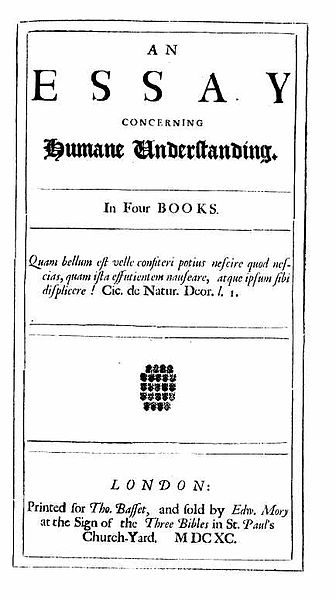Recommended edition: Locke, John. An Essay Concerning Human Understanding. Edited by Peter H. Nidditch. New York: Oxford University Press, 1975.
Excerpt:
Since it is the understanding, that sets man above the rest of sensible beings, and gives him all the advantage and dominion, which he has over them; it is certainly a subject, even for its nobleness, worth our labour to inquire into. The understanding, like the eye, whilst it makes us see and perceive all other things, takes no notice of itself; and it requires art and pains to set it at a distance, and make it its own object. But, whatever be the difficulties that lie in the way of this inquiry; whatever it be, that keeps us so much in the dark to ourselves; sure I am, that all the light we can let in upon our own minds, all the acquaintance we can make with our own understandings, will not only be very pleasant, but bring us great advantage, in directing our thoughts in the search of other things.
This, therefore, being my purpose, to inquire into the original, certainty, and extent of human knowledge; together with the grounds and degrees of belief, opinion, and assent. … It shall suffice to my present purpose, to consider the discerning faculties of a man, as they are employed about the objects, which they have to do with: And I shall imagine I have not wholly misemployed myself in the thoughts I shall have on this occasion, if, in this historical, plain method, I can give any account of the ways, whereby our understandings come to attain those notions of things we have, and can set down any measures of the certainty of our knowledge, or the grounds of those persuasions, which are to be found amongst men, so various, different, and wholly contradictory; and yet asserted, somewhere or other, with such assurance and confidence, that he that shall take a view of the opinions of mankind, observe their opposition, and at the same time consider the fondness and devotion wherewith they are embraced, the resolution and eagerness wherewith they are maintained, may perhaps have reason to suspect, that either there is no such thing as truth at all; or that mankind hath no sufficient means to attain a certain knowledge of it.
It is, therefore, worth while to search out the bounds between opinion and knowledge; and examine by what measures, in things, whereof we have no certain knowledge, we ought to regulate our assent, and moderate our persuasions.
Online:
Online Library of Liberty - Part 1 (Read Free Online)
Online Library of Liberty - Part 2 (Read Free Online)
Amazon
